Six mass shootings and 90 dead. What has Texas Gov. Greg Abbott done and has it been enough?
- Oops!Something went wrong.Please try again later.
Facing the largest audience of the 2022 campaign, Texas Gov. Greg Abbott sought to show he shared the horror and sorrow of the families in Uvalde, whose lives were forever scarred by the May 24 mass shooting that killed 19 elementary school children and their two teachers.
"I can feel their pain,” Abbott said during the Sept. 30 debate at the University of Texas Rio Grande Valley, which was aired or streamed to every corner of the state.
But in nearly the same breath, the two-term Republican told those families that he would not grant their pleas to make 21 the minimum age to purchase combat-style rifles like the one used by the 18-year-old gunman in Uvalde.
“We want to end school shootings, but we cannot do that by making false promises," Abbott said, asserting that the law the families are seeking would not pass constitutional muster even though Politifact had found flaws in the statement.
As routine as mass shootings have become in the Lone Star state, so have Abbott’s responses following massacres that together left 90 Texans dead, and dozens of others wounded.
Through the tears, the devastating losses, and innocent lives lost, Abbott’s mass shooting response playbook has become well practiced. He blames “madmen” for the carnage. For Abbott, any conversation centered on addressing Texas’ record of easy access to assault weapons has been a non-starter.
He’s rebuffed pleas for special sessions on gun violence yet ordered lawmakers back to Austin for issues ranging from rewriting election laws to passing measures targeting transgender people.
Mass killings database: Revealing trends, details and anguish of every US event since 2006
Abbott, who has witnessed six mass shootings during his two terms in shopping centers, churches, and schools, has not used his executive powers to champion ways to reduce mass shootings. This is in stark contrast to how he has wielded his political clout on issues like abortion, immigration, and tightening election rules.
Those who tuned in to the debate got a virtual front row seat to that strategy in action.
“We need to get to the bottom of what is really ailing our communities, and that is the mental health that is leading people to engage in school shootings,” Abbott said on the debate stage he shared with Democratic opponent Beto O'Rourke, echoing what he said one day after the massacre in Uvalde. To bolster the point, Abbott said the state has added billions of dollars for mental health programs since 2017, though Texas continues to rank near the bottom when it comes to access to mental health care.
But Uvalde, which came 5½ months before what is shaping up as Abbott's toughest political fight, has upended the governor's strategy for crisis in no small part due to missteps and his own misstatements.
Uvalde families, many of whom now actively campaign for O'Rourke, promise political consequence for inaction on the issue of assault-style weapons.
"Gov. Abbott, if you don't meet our demands (for stricter gun laws), then I suggest you prepare yourself, because we will vote you out," Veronica Mata, whose 10-year-old daughter, Tess Marie Mata, was killed at Robb Elementary School, said at a Capitol rally in late August.
Are gun ads in FTC’s crosshairs?: Critics decry ‘toxic’ messaging as firearm sales soar
How Uvalde has become Abbott's millstone
Despite the tearful pleas from the Uvalde families, Abbott has remained unwilling to consider any restrictions on gun purchases. Instead, the governor has tried to direct attention toward his strong-suit issues: immigration, crime, fentanyl and the economy.
Abbott rejected any such assertion outright.
"We will be involved with the city of Uvalde for years," he said during a new conference in mid-July. "I made that clear from the very beginning, and we will live up to that."
But since May 24, Uvalde has come to represent the governor’s greatest vulnerability in a political career that features an unbroken string of victories in statewide elections dating back to the 1990s.
The burden has been made heavier by Abbott’s own actions. At the same news conference in Uvalde when he made the reference to mental health, Abbott praised what he called the courage and quick response of the scores of law enforcement officials who raced to Robb Elementary upon hearing the first reports of gunfire.
The governor at that first news conference said the gunman exhibited "no meaningful forewarning of this crime." But a July report by a special Texas House committee tasked with investigating all aspects of the massacre described the gunman in the months leading up to the attack as "lonely and depressed, constantly teased by friends who called him a 'school shooter.'"
"The attacker began to demonstrate interest in gore and violent sex, watching and sometimes sharing gruesome videos and images of suicides, beheadings, accidents, and the like, as well as sending unexpected explicit messages to others online," the report states.
Abbott's storyline completely unraveled when the Austin American-Statesman published on July 12 an exclusive video that showed officers waited 77 minutes to confront and kill the gunman. Abbott has blame his misstatement on inaccurate reports he received in closed-door briefings from law enforcement and said he was “livid” over being in put in the position of misleading the public.
As the false tale of police heroism was crumbling, news organizations revealed that the governor, after learning of the carnage in Uvalde, kept to his reelection campaign schedule on the day of the shooting and attended a political fundraiser in Huntsville. He remained at the private event for about three hours before traveling to Uvalde the next day, according to later reports.
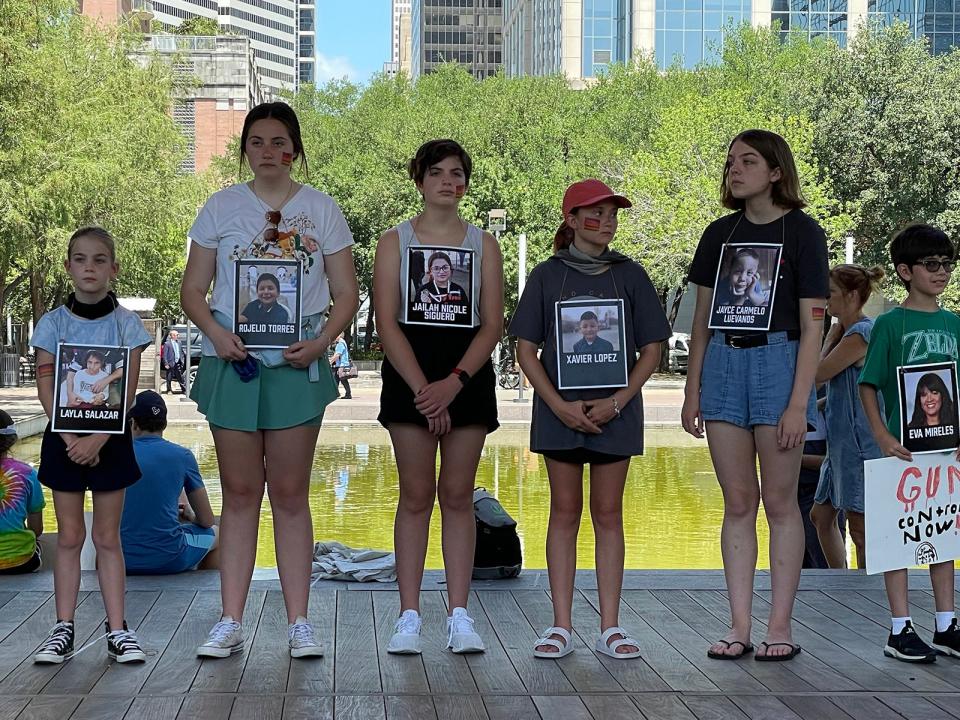
The same day he made the "livid" remark, the National Rifle Association hosted its convention in Houston. The nation's premier gun lobby rejected calls to postpone the gathering out of respect for the still-grieving community of Uvalde. Lt. Gov. Dan Patrick opted to cancel his appearance. Former President Donald Trump and U.S. Sen. Ted Cruz, R-Texas, went ahead with their plans to speak.
Abbott took a third approach: He opted out of appearing in person and went to Uvalde instead. But he sent a video message urging NRA members to "pray for those in Uvalde." And he added that "thousands of laws on the books" regulating firearms "have not stopped madmen from carrying out evil acts."
And when Abbott followed President Joe Biden and first lady Jill Biden to lay flowers at what became a memorial garden outside Robb Elementary, the Democratic president was met with cheers and the Republican governor was the target of boos and catcalls.
Abbott spoke to the USA Today Network last month about the need for accountability in the Uvalde shooting response but declined a follow-up interview for this story.
Texas and mental health
Abbott said in the debate that he has signed legislation that boosted funding for state mental health programs by $25 billion over the past five years. However, the 103-year-old nonprofit Mental Health America had rated Texas 44th among the states for the overall prevalence of mental illness and the ability to access care. For the prevalence of mental illness and the ability to access care among youth, Texas' ranking was 41st.
"In Texas, nearly three-quarters of youth with major depression did not receive mental health treatment," the organization said in its October 2021 report.
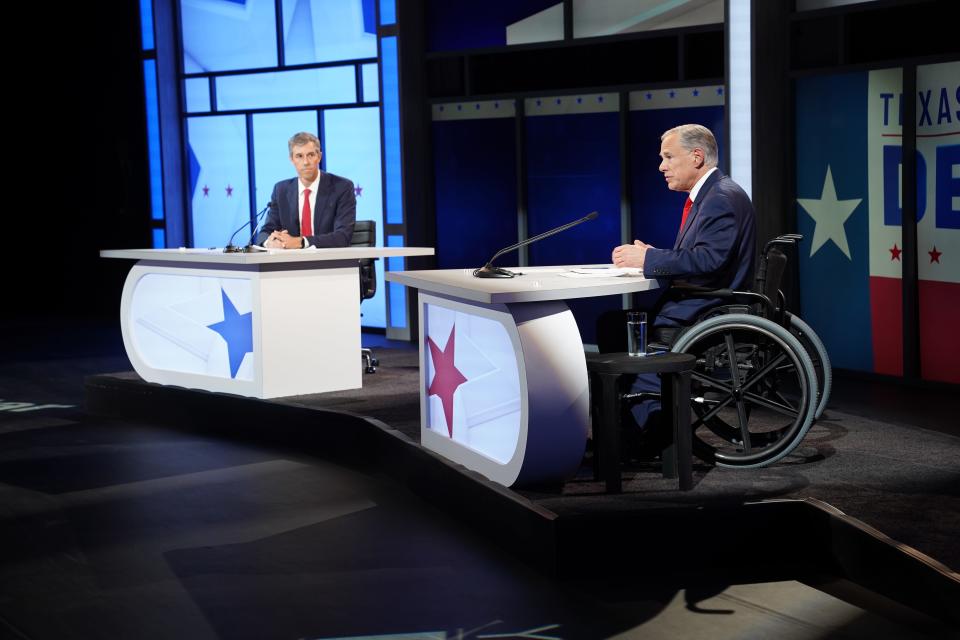
Three and a half weeks before Abbott first went to Uvalde and decried what he called "a problem with mental health illness" in that South Texas community, the governor's office announced it was shifting $210.7 million from the state Health and Human Services Commission to cover a shortfall in his border security initiative called Operation Lone Star.
The commission oversees state mental health programs. Agency officials said the diverted money was not earmarked for any specific program and that funding from the COVID-related federal CARES Act was available to cover any shortfalls.
Abbott's initiatives after Uvalde
Two days after the American-Statesman and KVUE jointly published security video showing law enforcement inaction in a Robb Elementary hallway as the mass shooting unfolded, and three days before the release of the House committee's report on the law enforcement response, Abbott scheduled a news conference in Houston.
But the topic had nothing to do with Uvalde. Instead he highlighted the dangers posed by the illegal cross-border importation of the synthetic opioid fentanyl. The message of the state-paid event dovetailed with Abbott's oft-stated campaign message of lax border security by the Biden administration. Still, reporters who attended steered their questions back to Uvalde, which dominated the event's headlines.
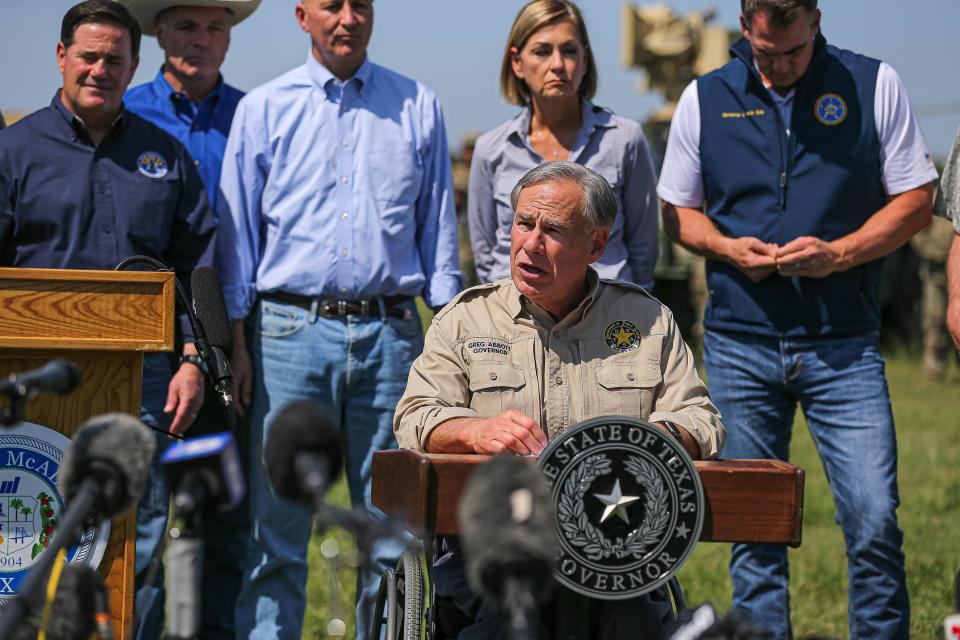
But Abbott pushes back at any suggestions that he’d like to put Uvalde in the rearview mirror. His official website contains numerous examples of state resources that have been sent to the community since the shooting:
$5 million as an "initial investment" in a Uvalde resiliency center to meet the community's mental health needs, including psychological first aid and crisis counseling for residents and first responders.
$1.2 million for school counseling and crisis intervention programs.
30 officers from the Texas Department of Public Safety to help provide security for the Uvalde school district during the 2022-23 school year.
$105 million for school safety initiatives statewide, nearly half of it to purchase bulletproof shields for police officers.
Private meetings with Abbott and Uvalde families and community members who had agreed to participate "to ensure they are receiving all the resources and support needed to heal," an aide told news outlets.
Mary Beth Fisk, the resiliency center's executive director, said the licensed counselors and therapists have provided a range of services, from helping with job placement to coping with grief to about 1,800 Uvalde residents, about half of them younger than 18. Citing privacy concerns, she declined to say survivors of the shooting were among those served.
Mass shootings: Why are mass shooters getting younger and deadlier? Experts have theories
Promises of accountability, but who should be held to account?
Several of the victims' family members, many of whom say they had not been politically active in the past, have been withering in their criticism of the governor. Their anger has centered not only on his own opposition to stricter laws on gun ownership,but on his decision to not convene a special session of the Legislature, where the 150 House members and 31 senators might find common ground on one of the thorniest issues they could face.
"Here we are 19 weeks since our lives were completely destroyed by gun violence, and not a single effort has been made by our current governor to prevent this from ever happening again," said Marissa Lozano, sister of Irma Garcia, one of the two Robb Elementary teachers who was shot to death. "Greg Abbott has refused to take action and has declined to even consider our valid concerns on sensible gun laws. Greg Abbott has abandoned us."
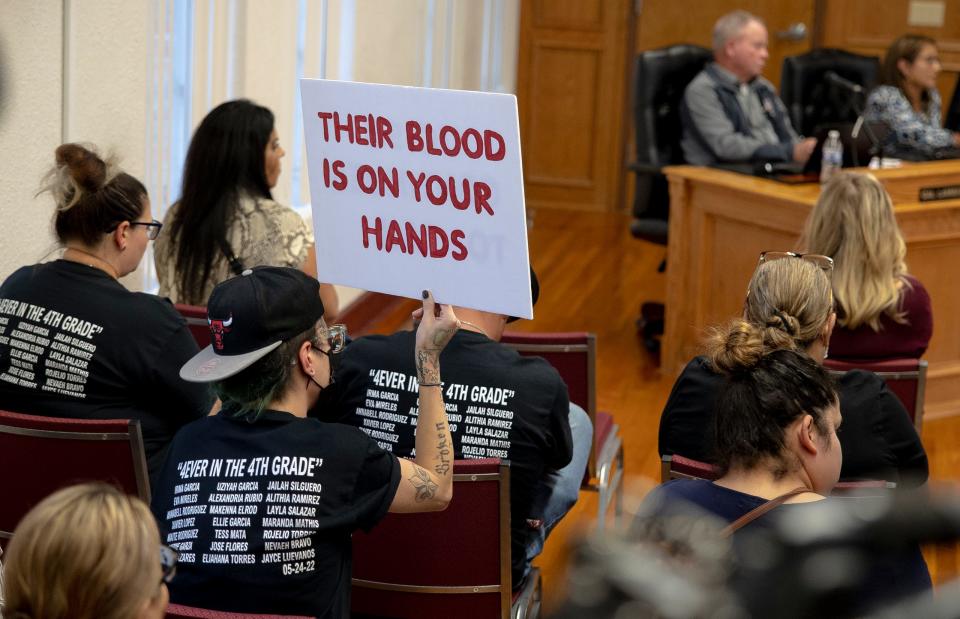
The comments came during an emotion-charged Oct. 8 news conference organized by the Texas Democratic Party where more than a dozen community members spoke. And it came just five weeks before Election Day as polls continued to show Abbott with a steady, single-digit lead over O'Rourke.
The Abbott campaign said afterward that it "would not politicize this tragedy."
Abbott, in a late September interview with the USA Today Network and again on the debate stage, promised accountability for the officers who hesitated to confront the gunman and for the incorrect early accounts about the shooting.
"All Texans — people in Uvalde, people in Texas, people across the country — they will know exactly what happened," he said in the interview.
Asked who should be held to account for the myriad missteps, the governor was less direct.
"There's multiple levels of accountability," he said. "The primary personal overall accountability was the incident commander, and the incident commander was the police chief of the Uvalde ISD police. For one. He did not use the appropriate protocol. But for another, it was whether him or his team that created a narrative that was very different (from) what reality was."
Many members of the Uvalde community and the state senator who represents the region have called for public information related to the shooting and the police response to be released.
Abbott told the USA Today Network "there's a need for speed" in getting the information out, but so far the DPS chief has deferred to the Uvalde County district attorney's request that it be kept sealed.
One person who has been held to account, Pete Arredondo, was fired as the school district police chief by the Uvalde school board Aug. 24. Later, when CNN reported that a DPS officer under investigation for her role in the shooting response had been hired by the district's police department, district officials fired her and suspended the force.
It's not just Uvalde: Gunfire on school grounds is at historic high in the US
During the debate, Abbott was asked, "Who misled you, and will they be held accountable?" He responded, "Everyone in that briefing room" and said full accountability would come "once all the facts become clear."
Jesse Rizo, whose 9-year-old niece, Jackie Cazares, was among those killed, said Abbott is using the former school district police chief and others to deflect what should be his own accountability.
"He faults people who gave him the information," Rizo said. "Mr. Abbott, you have the resources. You could have simply verified the information before you spoke."
An experienced 'consoler-in-chief'
By the time he took his place on the stage of the Uvalde High School auditorium, where he wore a military-style navy blue button-down shirt with the seal of his office above his left breast pocket, the governor of Texas was well-practiced in the role of the state's consoler-in-chief. Less then two years into his first term, Abbott was called to comfort a grieving Dallas community after a sniper shot 11 officers from several jurisdictions and killed five of them.
The officers who were shot, along with dozens of others on an evening in July 2016, were helping protect throngs of demonstrators during a march protesting recent shootings of Black men by law enforcement nationwide. Abbott praised the courage and heroism of all the police officers in Dallas that night.
Less than a year and a half later, the governor was in the tiny South Texas town of Sutherland Springs, where a man with a military-style weapon had gunned down more than two dozen people attending a Sunday church service. The gunman was fired upon by another man who used his own military-style rifle to help stop the attack. And Abbott praised the courage and heroism of an otherwise ordinary Texan.
There were more mass shootings: 10 dead in Santa Fe High School near Galveston on May 18, 2018; 23 dead and 23 more wounded at an El Paso shopping center on Aug. 3, 2019. Less than a month later, a shooting spree across Midland-Odessa took seven innocent lives and wounded two dozen others.
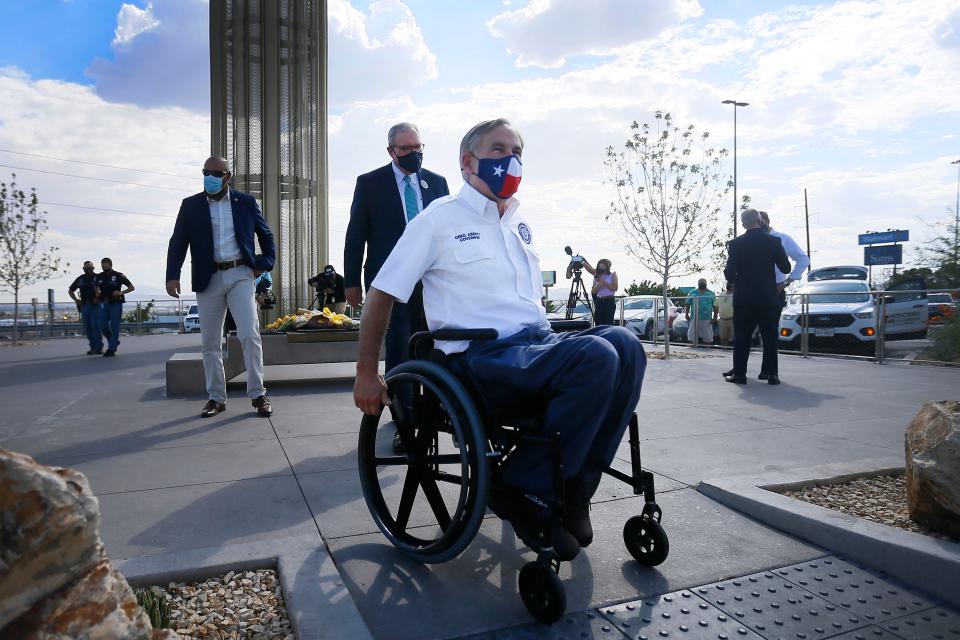
The events drew national attention, and the governor received nearly universal high marks for his compassion and for his promise to address the underlying causes of the violence. He assembled roundtable panels that included advocates on all sides of the gun debate, law enforcement experts, educators and mental health professionals.
Although the immediate post-Uvalde response started out like the others, it veered off course in a hurry. O'Rourke, who had been on defense on the issue of guns since entering the governor's race because of his 2019 "hell, yes" promise to confiscate assault-style rifles, went to Uvalde the day after the shooting and interrupted the governor's remarks in the high school auditorium.
“This is on you. This was totally predictable,” O’Rourke shouted at Abbott, calling out the governor's unwillingness to restrict assault-rifle sales even after so many mass shootings in Texas.
At the time, many observers — including Uvalde's mayor, who called O'Rourke "a sick son of a bitch" — denounced the Democrat's ploy as a tone-deaf political blunder that only worsened the community's anguish. But because of the botched law enforcement response to the shooting and the lingering frustration over what many see as a lack of accountability from Abbott down to the lowest-ranking officer on the scene, the aftermath of Uvalde has played out far differently from any of the other Texas tragedies on the governor's watch.
Gun laws vs. gun rights
Abbott anchored his "false promises" response to the raise-the-age question in part on an August ruling by a federal judge that struck down Texas' law limiting the sale of handguns to people under 21.
PolitiFact Texas examined the claim, looking into other cases Abbott had cited earlier, and found flaws in his reasoning that it would be unconstitutional to raise the age. One key finding was that the Supreme Court has yet to weigh in on whether age restrictions can be set when it comes to purchasing the type of weapon used in Uvalde. "Mostly False" is how Politifact described the statement.
The shooter purchased two assault-style rifles shortly after his 18th birthday and had been rebuffed in efforts to make the purchases before reaching that age.
Not only has opposing limits on gun rights been a hallmark of Abbott's tenure in office, so has expanding them. Since becoming governor in 2015, he has signed into law 14 bills that have added to — in some cases dramatically — the rights of Texans to arm themselves in public.
Among the new laws were removing the restrictions that handguns be concealed when carried; allowing the carrying of concealed handguns in dorms, classrooms and other buildings at public universities and colleges; dropping the prohibition against handguns in houses of worship; and eliminating the requirement that handgun owners be trained and licensed before being allowed to carry the guns in public.
The Legislature passed the unlicensed carry bill in 2021 over the objections of several law enforcement organizations on grounds that it would make Texas less safe. Still, at least one of those organizations — the Texas Municipal Police Association — has endorsed Abbott's reelection.
Six of the laws loosening gun restrictions were passed in 2019, the first time the Legislature convened after the Sutherland Springs, Santa Fe, El Paso and Midland-Odessa shootings. Advocates of such measures as red flag laws, raising the age limit to purchase assault-style rifles and ending the loopholes that allow gun buyers to bypass background check laws, went into the session hoping that the carnage of 2017 and 2018 would ease the gun lobby's hold on Texas' Republican leadership.
Gun rights activists were determined to tighten it. Even as the roundtable established after the massacre in El Paso was meeting behind closed doors in the Capitol, armed representatives of the Texas chapter of the Gun Owners Association of America were demonstrating outside warning that they would resist any efforts to roll back Second Amendment rights.
They needn't have worried.
Brett Cross, the uncle and legal guardian of 10-year-old Uvalde victim Uziyah Garcia, protested outside the Uvalde school district headquarters for 10 straight days and again outside the Governor's Mansion, has been brutal in news interviews and on social media in his criticism of Abbott's inaction on military-style weapons.
Four months after the massacre, Cross posted his frustration in a series of tweets.
"It’s been 4 months. And nothings changed. Nobody is being held accountable. Nothing has been done," Cross said. "Our kids deserve better. We deserve better."
John C. Moritz covers Texas government and politics for the USA Today Network in Austin. Contact him at jmoritz@gannett.com and follow him on Twitter @JohnnieMo.
This article originally appeared on USA TODAY: Six shootings, 90 dead. Has Gov. Greg Abbott's actions been enough?

